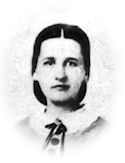March 8th, 1862.—I do not like Dr. Cleveland. I wonder how much longer he is going to stay? This morning while we were sitting at the breakfast table he was contending with Mother about the “sweet-briar.” It seems he has spent much time in England, perhaps he is an Englishman, but he insists that there has never been any “sweet briar,” or as he says, any “true Eglantine” in America. I think it is rude of him to be so positive with Mother, but Father says, “all scientific men love to dispute with the laity.” At last, when we were rising from the table Mother said, “Sue, show Dr. Cleveland the sweet briar by the school room.”
We went down the walk to the frame where it grew and I pointed it out to him. Now this happened to be the very tangle of vines into which I threw my algebra, on that memorable day when Miss Darner made me pick it up. The vines are all thorns and they scratched me dreadfully. Dr. Cleveland inspected the vine, pinched a leaf, smelled it, sniffing loudly and then he said, “This is the true Eglantine.”
“Mother told you it was,” I replied.
He took from his pocket a small sketch-book and pencil and proceeded to make a picture of it, not a finished drawing but just a sketch. He replaced the book and pencil in his pocket and, trying to speak very pleasantly, he said: “When I get to my drawing materials I shall make and send you a pretty picture of this Eglantine, it is very rare.”
“Do not trouble to do that, please, I have no pleasant associations with that thorny tangle,” I answered, and we returned to the house.
The mail had arrived in our absence and the family were gathered around the library table; aunt Robinson handed me a letter from Brother Junius, saying as she did so, “Here is another birthday gift for you.”
Dr. Cleveland, who was apologizing awkwardly to Mother for contradicting her so flatly as to the sweet briar, turned to Father and asked, “Her birthday, is it, how old?” “Sixteen,” said Father. “Indeed—” went on the talkative man of science, “I should never have imagined it—there is none of the `beaute du diable,’ which we naturally associate with that age.” “No,” said Father, “and I am glad of it, I do not want my baby to grow up too fast.”
Then the whole crowd proceeded to discuss me as calmly as if I had been one of my own dolls. It was embarrassing but I found out what they thought of me. Among other things, I learned that I was bluntly truthful and would have to learn that Madam de Geniis’ “Palace of Truth” was not practical and a white lie could sometimes be used to advantage. Mother’s constant teaching of the Ten Commandments will, I think, make even white lies difficult for me, though I do try to be polite.
I had some pretty presents even if it is war times, and I got a nice letter from Brother Junius, written two days ago so I would get it today. Brother Amos is here and Sister Mag is happy, we are too, for all love our jolly soldier boy, he has been at home for ten days and he has only two weeks furlough. It will be hard for Sister Mag to let him go.
There is something I have never told you, my Diary; ever since that day in August of last year, when we went to the depot to see the Howell Guards off to Virginia, Sister Mag has never failed to lock herself in her room for awhile every day to pray for her husband. I did not know just at first what she was doing, but I heard her tell him she never let a day pass without asking God to take care of him and he might know, wherever he might be, that her thoughts and her prayers were following him.
I felt real mean to have overheard this, for it was never intended for my ears, but I had sung Eddie to sleep and was holding him in my arms in the dark, waiting for Nellie to come for him, and they were talking on the porch just outside.



